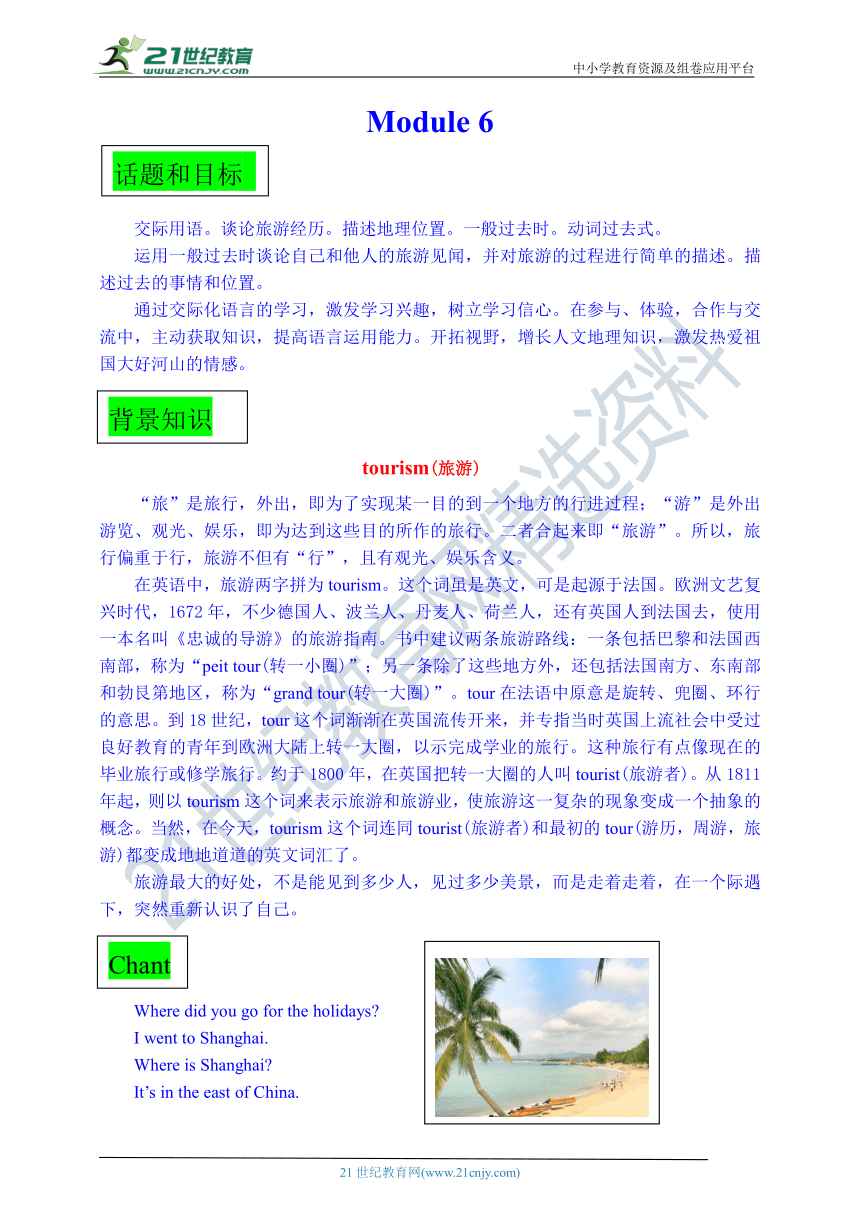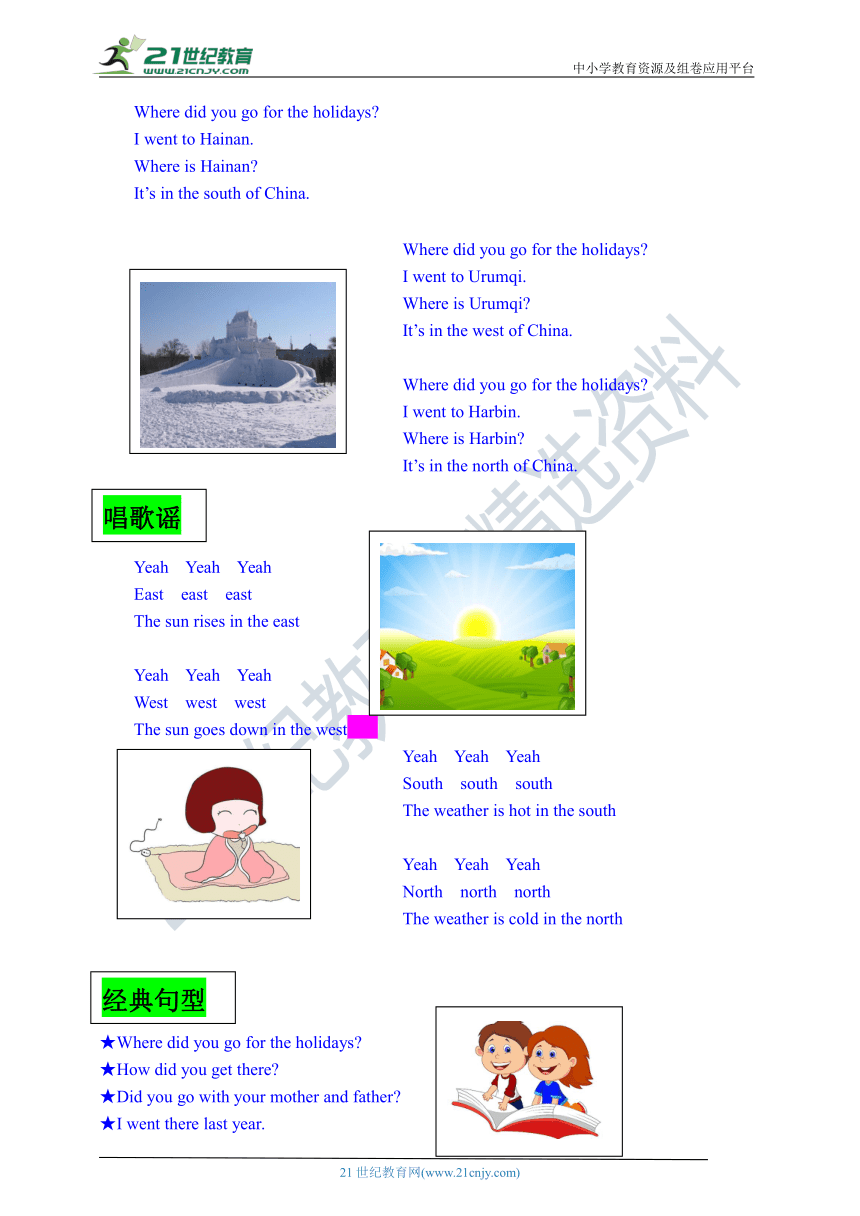外研版(三年级起点)五年级下学期用Module 6趣味英语读和练(含答案)
文档属性
| 名称 | 外研版(三年级起点)五年级下学期用Module 6趣味英语读和练(含答案) |

|
|
| 格式 | doc | ||
| 文件大小 | 2.7MB | ||
| 资源类型 | 试卷 | ||
| 版本资源 | 外研版(三年级起点) | ||
| 科目 | 英语 | ||
| 更新时间 | 2021-11-25 15:43:33 | ||
图片预览


文档简介
中小学教育资源及组卷应用平台
Module 6
交际用语。谈论旅游经历。描述地理位置。一般过去时。动词过去式。
运用一般过去时谈论自己和他人的旅游见闻,并对旅游的过程进行简单的描述。描述过去的事情和位置。
通过交际化语言的学习,激发学习兴趣,树立学习信心。在参与、体验,合作与交流中,主动获取知识,提高语言运用能力。开拓视野,增长人文地理知识,激发热爱祖国大好河山的情感。
tourism(旅游)
“旅”是旅行,外出,即为了实现某一目的到一个地方的行进过程;“游”是外出游览、观光、娱乐,即为达到这些目的所作的旅行。二者合起来即“旅游”。所以,旅行偏重于行,旅游不但有“行”,且有观光、娱乐含义。
在英语中,旅游两字拼为tourism。这个词虽是英文,可是起源于法国。欧洲文艺复兴时代,1672年,不少德国人、波兰人、丹麦人、荷兰人,还有英国人到法国去,使用一本名叫《忠诚的导游》的旅游指南。书中建议两条旅游路线:一条包括巴黎和法国西南部,称为“peit tour(转一小圈)”;另一条除了这些地方外,还包括法国南方、东南部和勃艮第地区,称为“grand tour(转一大圈)”。tour在法语中原意是旋转、兜圈、环行的意思。到18世纪,tour这个词渐渐在英国流传开来,并专指当时英国上流社会中受过良好教育的青年到欧洲大陆上转一大圈,以示完成学业的旅行。这种旅行有点像现在的毕业旅行或修学旅行。约于1800年,在英国把转一大圈的人叫tourist(旅游者)。从1811年起,则以tourism这个词来表示旅游和旅游业,使旅游这一复杂的现象变成一个抽象的概念。当然,在今天,tourism这个词连同tourist(旅游者)和最初的tour(游历,周游,旅游)都变成地地道道的英文词汇了。
旅游最大的好处,不是能见到多少人,见过多少美景,而是走着走着,在一个际遇下,突然重新认识了自己。
Where did you go for the holidays
I went to Shanghai.
Where is Shanghai
It’s in the east of China.
Where did you go for the holidays
I went to Hainan.
Where is Hainan
It’s in the south of China.
Where did you go for the holidays
I went to Urumqi.
Where is Urumqi
It’s in the west of China.
Where did you go for the holidays
I went to Harbin.
Where is Harbin
It’s in the north of China.
Yeah Yeah Yeah
East east east
The sun rises in the east
Yeah Yeah Yeah
West west west
The sun goes down in the west
Yeah Yeah Yeah
South south south
The weather is hot in the south
Yeah Yeah Yeah
North north north
The weather is cold in the north
★Where did you go for the holidays
★How did you get there
★Did you go with your mother and father
★I went there last year.
★It’s in the west of China.
★I went Hainan in July and I bought a hat.
★She had a lovely time there.
A: Kate. Where did you go last week
B: I went to Sanya.
A: Where is Sanya
B: It’s in Hainan,
and it’s in the south of China.
A: Who did you go with
B: My parents.
A: How long did you stay there
B: For five days.
A: Oh. What do you think of Sanya
B: It's very beautiful.
A: What did you do there
B: We went to the ends of the earth in Hainan Island. We went to the beach and swam. We had lots of delicious seafood. And we took some interesting photos.
A: Wow! That sounds great!
holiday来历
历史上的假日基本上都来自宗教节日。英语中表示“假日”的单词holiday其实就是由holy day(神圣的日子)组合而成。
在现代英语用法中,对于holiday和holy day (或holyday ),我们要对两者加以区别,前者泛指任何“假日”和“节日”,后者则特指“圣日”或“宗教节日”。但最早holiday仅指“宗教节日”,因为holiday就是holy day二词复合而成的。后来holiday的词义逐渐扩大,到了14世纪,holiday也指一般休息日,直至最后其宗教色彩消失为止。只要我们考虑到许多节日起源于宗教活动这一点,我们对holiday的词义变化就不会感到奇怪了。请看下面的例句:
New Year’s Day is a public holiday. 元旦是公共假日。
I had a happy holiday this summer.
今年夏天我度过了一个愉快的假期。
Today is Sunday, our holiday. 今天星期日,是我们的休息日。
●Determined to think of the true character, reading must do the hard work.
立志宜思真品格,读书须尽苦功夫。
●Learning, learning, and learning! Learn and then know the problem.
学习,学习,再学习!学,然后知不足。
●It is not difficult to learn a foreign language, learning a foreign language is like
making friends, friends are the more pay more familiar, meet every day, between friends intimacy. 学习外语并不难,学习外语就像交朋友一样,朋友是越交越熟的,天天见面,朋友之间就亲密无间了。
●Learn to have three hearts, a confidence, two determination, three perseverance. 学习要有三心,一信心,二决心,三恒心。
●Learn to be good at thinking, thinking, thinking, thinking, thinking, thinking, thinking, thinking. 学习知识要善于思考,思考,再思考。
●Reading and writing are the two most necessary learning methods for students, and also the two windows to the world around them. 读和写是学生最必要的两种学习方法,也是通向周围世界的两扇窗口。
go south到底是不是“去南方”
乍一看,这个词组太简单了,这不是“去南方”的意思吗?可别小看了这么一个简单的习语哦。请看下面的句子,你就会恍然大悟!
The dog has gone south into the night. 狗已消失在夜色中了。
Everything went south after I lost the job. 我失去工作后事事都不顺利。
Autumn is coming, ice cream sales go south.
秋季要来了,冰淇淋的销量越来越差了。
英语中很多词汇的意义随着时代的变迁不断发生变化。在80年代之前,go south用法只限于字面意思,即“去南方”。而到了80年代中后期,这个词汇被广泛用作习语,意思变化层出不穷。
go south 的比喻意义通常指“消失;下降;变坏/ 糟糕;减少”。
go south不过是根据地图“上北下南”的规定,才用来代表任何下降趋势、走势。如果是某人go south,这意味着他或她让你失望了;如果是股票市场go south,你将很可能会被套牢;如果是运动员go south,这意味着已经过了巅峰期;如果是电脑go south,那意味着某些软硬件坏了。总之,go south可以非常灵活地用于表述各种带有贬义的情形。
找答语,找出能回答左边句子的答语,将字母代号填在括号中。
( )1. Where did you go for the holidays A. Yes, I did.
( )2. Can I see your photos B. It’s in the north of China.
( )3. How did you get there C. I went to Yinchuan.
( )4. Did you go with your father D. I went there by train.
( )5. Where is Beijing E. Of course.
“考点演练”参考答案
Module 6
1. C 2. E 3. D 4. A 5. B
话题和目标
背景知识
Chant
唱歌谣
经典句型
情景对话
英语知识窗
英语名言
经典英语
考点演练
21世纪教育网 www.21cnjy.com 精品试卷·第 2 页 (共 2 页)
HYPERLINK "http://21世纪教育网(www.21cnjy.com)
" 21世纪教育网(www.21cnjy.com)
Module 6
交际用语。谈论旅游经历。描述地理位置。一般过去时。动词过去式。
运用一般过去时谈论自己和他人的旅游见闻,并对旅游的过程进行简单的描述。描述过去的事情和位置。
通过交际化语言的学习,激发学习兴趣,树立学习信心。在参与、体验,合作与交流中,主动获取知识,提高语言运用能力。开拓视野,增长人文地理知识,激发热爱祖国大好河山的情感。
tourism(旅游)
“旅”是旅行,外出,即为了实现某一目的到一个地方的行进过程;“游”是外出游览、观光、娱乐,即为达到这些目的所作的旅行。二者合起来即“旅游”。所以,旅行偏重于行,旅游不但有“行”,且有观光、娱乐含义。
在英语中,旅游两字拼为tourism。这个词虽是英文,可是起源于法国。欧洲文艺复兴时代,1672年,不少德国人、波兰人、丹麦人、荷兰人,还有英国人到法国去,使用一本名叫《忠诚的导游》的旅游指南。书中建议两条旅游路线:一条包括巴黎和法国西南部,称为“peit tour(转一小圈)”;另一条除了这些地方外,还包括法国南方、东南部和勃艮第地区,称为“grand tour(转一大圈)”。tour在法语中原意是旋转、兜圈、环行的意思。到18世纪,tour这个词渐渐在英国流传开来,并专指当时英国上流社会中受过良好教育的青年到欧洲大陆上转一大圈,以示完成学业的旅行。这种旅行有点像现在的毕业旅行或修学旅行。约于1800年,在英国把转一大圈的人叫tourist(旅游者)。从1811年起,则以tourism这个词来表示旅游和旅游业,使旅游这一复杂的现象变成一个抽象的概念。当然,在今天,tourism这个词连同tourist(旅游者)和最初的tour(游历,周游,旅游)都变成地地道道的英文词汇了。
旅游最大的好处,不是能见到多少人,见过多少美景,而是走着走着,在一个际遇下,突然重新认识了自己。
Where did you go for the holidays
I went to Shanghai.
Where is Shanghai
It’s in the east of China.
Where did you go for the holidays
I went to Hainan.
Where is Hainan
It’s in the south of China.
Where did you go for the holidays
I went to Urumqi.
Where is Urumqi
It’s in the west of China.
Where did you go for the holidays
I went to Harbin.
Where is Harbin
It’s in the north of China.
Yeah Yeah Yeah
East east east
The sun rises in the east
Yeah Yeah Yeah
West west west
The sun goes down in the west
Yeah Yeah Yeah
South south south
The weather is hot in the south
Yeah Yeah Yeah
North north north
The weather is cold in the north
★Where did you go for the holidays
★How did you get there
★Did you go with your mother and father
★I went there last year.
★It’s in the west of China.
★I went Hainan in July and I bought a hat.
★She had a lovely time there.
A: Kate. Where did you go last week
B: I went to Sanya.
A: Where is Sanya
B: It’s in Hainan,
and it’s in the south of China.
A: Who did you go with
B: My parents.
A: How long did you stay there
B: For five days.
A: Oh. What do you think of Sanya
B: It's very beautiful.
A: What did you do there
B: We went to the ends of the earth in Hainan Island. We went to the beach and swam. We had lots of delicious seafood. And we took some interesting photos.
A: Wow! That sounds great!
holiday来历
历史上的假日基本上都来自宗教节日。英语中表示“假日”的单词holiday其实就是由holy day(神圣的日子)组合而成。
在现代英语用法中,对于holiday和holy day (或holyday ),我们要对两者加以区别,前者泛指任何“假日”和“节日”,后者则特指“圣日”或“宗教节日”。但最早holiday仅指“宗教节日”,因为holiday就是holy day二词复合而成的。后来holiday的词义逐渐扩大,到了14世纪,holiday也指一般休息日,直至最后其宗教色彩消失为止。只要我们考虑到许多节日起源于宗教活动这一点,我们对holiday的词义变化就不会感到奇怪了。请看下面的例句:
New Year’s Day is a public holiday. 元旦是公共假日。
I had a happy holiday this summer.
今年夏天我度过了一个愉快的假期。
Today is Sunday, our holiday. 今天星期日,是我们的休息日。
●Determined to think of the true character, reading must do the hard work.
立志宜思真品格,读书须尽苦功夫。
●Learning, learning, and learning! Learn and then know the problem.
学习,学习,再学习!学,然后知不足。
●It is not difficult to learn a foreign language, learning a foreign language is like
making friends, friends are the more pay more familiar, meet every day, between friends intimacy. 学习外语并不难,学习外语就像交朋友一样,朋友是越交越熟的,天天见面,朋友之间就亲密无间了。
●Learn to have three hearts, a confidence, two determination, three perseverance. 学习要有三心,一信心,二决心,三恒心。
●Learn to be good at thinking, thinking, thinking, thinking, thinking, thinking, thinking, thinking. 学习知识要善于思考,思考,再思考。
●Reading and writing are the two most necessary learning methods for students, and also the two windows to the world around them. 读和写是学生最必要的两种学习方法,也是通向周围世界的两扇窗口。
go south到底是不是“去南方”
乍一看,这个词组太简单了,这不是“去南方”的意思吗?可别小看了这么一个简单的习语哦。请看下面的句子,你就会恍然大悟!
The dog has gone south into the night. 狗已消失在夜色中了。
Everything went south after I lost the job. 我失去工作后事事都不顺利。
Autumn is coming, ice cream sales go south.
秋季要来了,冰淇淋的销量越来越差了。
英语中很多词汇的意义随着时代的变迁不断发生变化。在80年代之前,go south用法只限于字面意思,即“去南方”。而到了80年代中后期,这个词汇被广泛用作习语,意思变化层出不穷。
go south 的比喻意义通常指“消失;下降;变坏/ 糟糕;减少”。
go south不过是根据地图“上北下南”的规定,才用来代表任何下降趋势、走势。如果是某人go south,这意味着他或她让你失望了;如果是股票市场go south,你将很可能会被套牢;如果是运动员go south,这意味着已经过了巅峰期;如果是电脑go south,那意味着某些软硬件坏了。总之,go south可以非常灵活地用于表述各种带有贬义的情形。
找答语,找出能回答左边句子的答语,将字母代号填在括号中。
( )1. Where did you go for the holidays A. Yes, I did.
( )2. Can I see your photos B. It’s in the north of China.
( )3. How did you get there C. I went to Yinchuan.
( )4. Did you go with your father D. I went there by train.
( )5. Where is Beijing E. Of course.
“考点演练”参考答案
Module 6
1. C 2. E 3. D 4. A 5. B
话题和目标
背景知识
Chant
唱歌谣
经典句型
情景对话
英语知识窗
英语名言
经典英语
考点演练
21世纪教育网 www.21cnjy.com 精品试卷·第 2 页 (共 2 页)
HYPERLINK "http://21世纪教育网(www.21cnjy.com)
" 21世纪教育网(www.21cnjy.com)
同课章节目录
- Module 1
- Unit 1 We lived in a small house.
- Unit 2 She didn't have a television.
- Module 2
- Unit 1 She learnt English.
- Unit 2 Mr Li was a teacher.
- Module 3
- Unit 1 She had eggs and sausages.
- Unit 2 Sam ate four hamburgers.
- Module 4
- Unit 1 Let's make a home library.
- Unit 2 We can find information from books and CDs.
- Module 5
- Unit 1 It's big and light.
- Unit 2 It's too big for you.
- Module 6
- Unit 1 I went there last year.
- Unit 2 She visited the Tianchi Lake.
- Module 7
- Unit 1 My father goes to work at eight o'clock eve
- Unit 2 I'll be home at seven o'clock.
- Module 8
- Unit 1 Will you help me?
- Unit 2 I made a kite.
- Module 9
- Unit 1 We laughed a lot.
- Unit 2 Mum bought new T-shirts for you.
- Module 10
- Unit 1 Where are you going to go?
- Unit 2 I'm in New York now.
- Review Module
- Unit 1
- Unit 2
